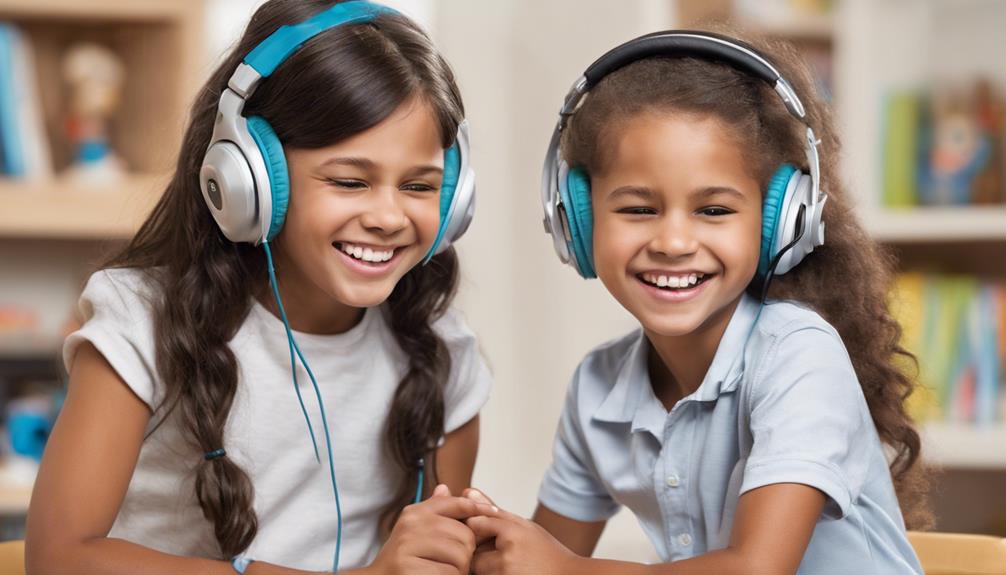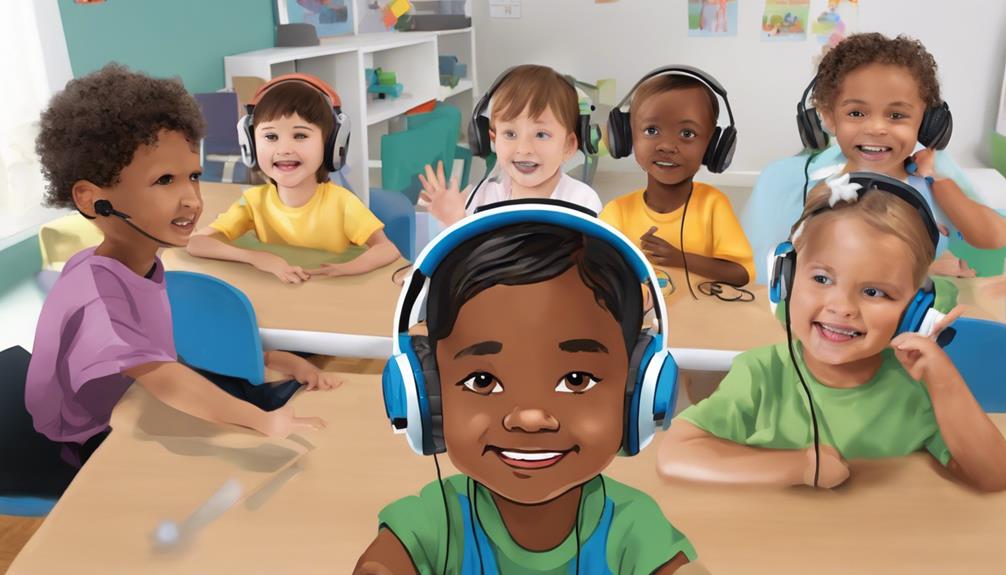When considering auditory training therapy, it is akin to opening a door to a world brimming with opportunities and improvements. This therapy’s effects extend beyond simply improving hearing; it can also enhance our cognitive abilities in unexpected ways.
From sharpening our listening skills to boosting communication abilities, auditory training therapy holds the key to a realm of improvements waiting to be explored.
Key Takeaways
- Enhances speech clarity in challenging environments
- Improves listening skills for better communication
- Develops multitasking abilities and auditory attention
- Increases therapy engagement through interactive, game-like formats
Enhancing Listening Skills
Enhancing listening skills through auditory training therapy involves focusing on improving speech understanding in challenging environments. By participating in auditory training programs, individuals can enhance their ability to comprehend speech, even in noisy or difficult situations. This training not only benefits those with hearing loss but also individuals looking to sharpen their listening skills for better communication.
Moreover, auditory training can help improve multi-tasking abilities, allowing individuals to better focus and process information during conversations. Tailored programs that incorporate a companion's voice have been shown to enhance communication dynamics, especially within relationships. By practicing with a familiar voice, individuals can improve their listening skills in real-life scenarios where understanding a partner's speech is crucial.
Additionally, the game-like formats often used in auditory training make the therapy engaging and enjoyable. This approach increases motivation and participation, leading to more significant improvements in listening skills over time. In conclusion, auditory training therapy offers a comprehensive approach to enhancing listening skills, speech understanding, and communication abilities in various challenging environments.
Boosting Communication Abilities

When considering auditory training therapy for boosting communication abilities, it's crucial to highlight the benefits such as:
- Enhancing speech clarity
- Improving listening skills
- Fostering better social interactions
By focusing on developing auditory attention skills and working memory, individuals can experience significant improvements in their overall communication abilities.
Tailored programs using familiar voices, like a spouse's, can further enhance communication effectiveness and contribute to lasting benefits in various social contexts.
Enhancing Speech Clarity
Improving speech clarity through auditory training therapy involves enhancing the brain's ability to effectively process and understand speech signals. This targeted approach sharpens auditory processing skills and leads to clearer speech perception, especially in challenging listening environments.
Here are five key ways auditory training therapy enhances speech clarity:
- Sharpening auditory processing skills.
- Distinguishing speech sounds better.
- Improving overall speech perception.
- Focusing on relevant auditory information.
- Enhancing speech clarity in challenging listening environments.
These strategies work together to boost communication abilities by improving the reception and understanding of spoken information, particularly beneficial for individuals with hearing difficulties.
Improving Listening Skills
To bolster communication abilities in auditory training therapy, exercises targeting speech understanding in challenging environments can significantly enhance listening skills. These exercises challenge individuals to process speech amidst background noise or in crowded settings, improving their ability to focus on the speaker's voice.
By engaging in auditory training programs, individuals can enhance their auditory attention skills, enabling them to better concentrate on important auditory cues. This heightened focus can lead to improved speech understanding and overall communication abilities.
Additionally, the training may enhance multi-tasking capabilities, allowing individuals to manage various auditory stimuli simultaneously. Tailored programs utilizing a companion's voice can also strengthen spousal communication, fostering better listening skills and enhancing overall interaction in challenging listening environments.
Enhancing Social Interactions
Enhancing social interactions through auditory training therapy involves honing communication abilities to navigate various social settings with confidence and clarity.
- Auditory training therapy can enhance speech understanding in noisy environments.
- It helps develop effective communication strategies for group conversations.
- Improving auditory attention skills leads to better active listening during interactions.
- Recognizing subtle cues in speech improves understanding in social settings.
- Participation in conversations increases, reducing isolation and enhancing overall social interactions.
Improving Speech Understanding

Auditory training therapy targets key skills like auditory attention, working memory, and auditory processing speed to enhance speech understanding in challenging environments. By improving these fundamental abilities, individuals can better comprehend and engage in conversations, even amidst background noise or distractions.
Tailored training programs with speech stimuli have shown significant success in enhancing speech perception and overall communication skills.
Clearer Speech Perception
Improving speech understanding can be significantly enhanced through auditory training therapy, leading to clearer speech perception even in challenging listening environments. Auditory training therapy focuses on improving speech perception, which plays a crucial role in communication.
Here are five key benefits of clearer speech perception through auditory training therapy:
- Enhanced ability to process and understand speech sounds effectively.
- Improved speech discrimination, making it easier to distinguish between similar speech sounds.
- Better comprehension of conversations, even in complex listening situations.
- Increased clarity in understanding speech, particularly in noisy environments.
- Enhanced communication skills and interactions, contributing to a better overall quality of life.
Enhanced Communication Skills
Our training programs aim to refine communication skills by honing auditory processing abilities in challenging listening environments. Through targeted auditory training therapy, individuals can enhance their auditory attention and working memory, leading to improved speech understanding even in noisy or distracting situations.
By honing these skills, individuals can better focus on conversations, keep up with fast talkers, and participate more effectively in group discussions. Additionally, training programs provide strategies to help individuals remember and process spoken information accurately, ultimately leading to enhanced communication outcomes in daily life.
This tailored approach equips individuals with the tools needed to navigate various communication challenges, fostering clearer and more effective interactions with others.
Enhancing Auditory Attention Skills

Enhancing auditory attention skills is crucial for improving focus and comprehension in challenging listening environments. When it comes to auditory training, honing in on attention skills can significantly impact one's ability to concentrate on speech and sounds amidst distractions.
- Auditory training therapy is effective for enhancing auditory attention skills.
- Improved attention skills aid in focusing on speech and sounds in challenging environments.
- Training programs specifically target attention skills to boost overall concentration.
- Research indicates that auditory training can lead to better multitasking abilities by improving attention.
- Individuals engaging in auditory training may notice a heightened ability to filter out background noise and distractions.
Boosting Ability to Multi-Task

Boosting our ability to multitask can be achieved through auditory training therapy, which enhances auditory attention skills crucial for handling multiple tasks simultaneously. By engaging in auditory training programs, individuals can improve their multitasking abilities, even without hearing loss.
These programs focus on developing the brain's capacity to manage various auditory tasks concurrently, leading to better performance in challenging listening environments. Through auditory training, individuals can enhance their processing efficiency, allowing them to process and respond to multiple auditory stimuli more effectively.
This improvement in multitasking skills can have significant benefits in various aspects of life where the ability to juggle multiple tasks is essential. Therefore, investing in auditory training to boost multitasking abilities can be a valuable tool for enhancing overall cognitive function and performance in demanding situations.
Improving Spousal Communication

Improving spousal communication can be effectively achieved through tailored auditory training programs that utilize a companion's voice to enhance relationship dynamics and understanding. Engaging in such programs can significantly benefit couples by improving their communication skills and fostering a deeper connection.
Here are five key ways auditory training can enhance spousal communication:
- Tailored auditory training programs cater to the specific needs of each couple, addressing communication challenges effectively.
- Enhanced listening skills acquired through auditory training can lead to better understanding and empathy between partners.
- Participating in auditory training together creates a shared experience, promoting teamwork in overcoming communication obstacles.
- Utilizing game-like formats in auditory training makes the process enjoyable for both partners, increasing engagement and mutual connection.
- Improved communication dynamics resulting from auditory training can reduce frustration and misunderstandings in the relationship, leading to a more harmonious bond.
Making Therapy More Engaging

To enhance the engagement of therapy sessions, auditory training programs are evolving to incorporate elements reminiscent of video games, aiming to improve user experience and increase motivation. By introducing game-like formats into auditory training, therapy becomes more engaging and enjoyable for participants.
Nancy Tye-Murray highlights the potential benefits of creating enjoyable training programs to make therapy more appealing to individuals undergoing auditory training. The shift towards more engaging auditory training programs is crucial as it can significantly improve motivation and adherence to the therapy regimen.
When therapy sessions are interactive and entertaining, participants are more likely to actively participate and commit to the program, ultimately optimizing therapy outcomes. The incorporation of enjoyable elements not only enhances user experience but also fosters a sense of enjoyment and accomplishment throughout the therapy process.
As auditory training continues to evolve, the focus on making therapy more engaging through video game-like features is a promising approach to increase participant involvement and overall effectiveness.
Frequently Asked Questions
What Are Benefits of Auditory Training?
We believe the benefits of auditory training are substantial. It can enhance speech understanding, improve auditory attention skills, and boost communication in challenging environments.
Tailored programs using a companion's voice can improve spousal communication. The engaging, game-like formats make auditory training enjoyable.
These benefits can last for at least three months, showcasing the positive impact of auditory training on various aspects of communication and attention.
What Are the Goals of Auditory Training?
When it comes to auditory training, our main goals are to enhance auditory attention skills and develop effective communication strategies.
We aim to improve speech understanding, even for individuals without hearing loss, by teaching compensatory strategies for better daily listening experiences.
Our focus is on educating others about hearing loss and communication needs, ultimately helping individuals navigate challenging environments and strengthen relationships with loved ones.
What Is the Primary Function of Auditory Training Therapy?
The primary function of auditory training therapy is to enhance hearing and listening skills through targeted exercises and activities.
It focuses on improving auditory processing abilities like sound detection, discrimination, and comprehension.
By engaging in this therapy, individuals can work on challenges in speech understanding, especially in noisy environments.
Auditory training therapy helps develop auditory attention skills, leading to better multi-tasking abilities and overall communication skills.
What Are the Benefits of Auditory-Verbal Therapy?
We believe Auditory-Verbal Therapy (AVT) offers numerous benefits. It enhances spoken language skills, leading to improved academic performance. Beginning therapy early, around two to three months old, yields the best outcomes.
AVT aids children with hearing loss in excelling in mainstream education. Parental involvement is key, as they participate in therapy sessions and continue auditory development activities at home. Ultimately, AVT empowers children to thrive in their education and communication skills.
How Can Auditory Training Therapy Improve Specific Auditory Processing Goals?
Auditory training therapy can improve specific auditory processing therapy goals by targeting key areas such as speech discrimination, auditory memory, and sound localization. By customizing exercises to address these specific auditory processing therapy goals, individuals can make significant improvements in their listening and comprehension skills.
Conclusion
In conclusion, auditory training therapy serves as a symphony conductor orchestrating a harmonious blend of improved listening skills, communication abilities, speech understanding, auditory attention, multitasking, and spousal communication.
Like a well-composed melody, this tailored program enhances cognitive functions, paving the way for a clearer, more connected auditory experience.
Embrace the transformative power of auditory training therapy and unlock the potential for a richer, more vibrant auditory world.










